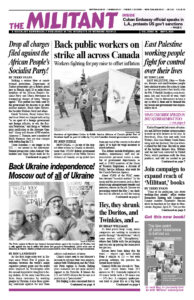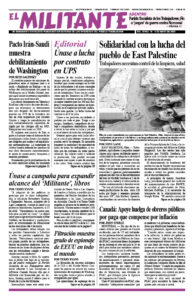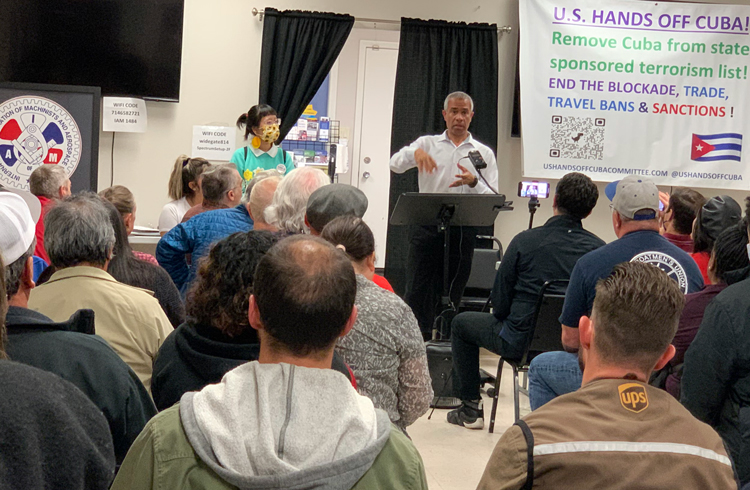LOS ANGELES — Alejandro García del Toro, deputy chief of the Cuban Embassy in Washington, D.C., and Javier Levy Hernández, a first secretary there, spoke to a community meeting of 75 people at the International Association of Machinists union hall in the Wilmington neighborhood here April 18, describing the impact of the more than 60-year-long U.S. economic war on Cuba.
“Over 240 added sanctions were imposed on Cuba under Donald Trump and President Joseph Biden didn’t remove them,” García said. “We are suffering from lack of medicine, loss of trade partners. And because Cuba was put on the list of state sponsors of terrorism we can’t access the international banking system.”
The U.S. economic, financial and trade sanctions make it “difficult to sustain our health care system” and “have caused a long-term loss of tourism income.” García noted that in the middle of the COVID-19 pandemic, Cuba’s facility that produced oxygen for hospitals broke down. The Biden administration turned down their request for a license to import oxygen.
The U.S. rulers have never forgiven the Cuban people for overthrowing the U.S.-backed Fulgencio Batista dictatorship, bringing to power a government of workers and farmers, and making a socialist revolution.
Amid the tightening of U.S. sanctions, Cuba developed its own vaccines for COVID, which it used to vaccinate the overwhelming majority of the population and made them available to other countries. “We are continuing with life, we approved a new family code, our biotechnology industry continues,” García said.
The sanctions make it impossible to import any product that has as little as 10% material made in the U.S. “The U.S. claims their sanctions are bilateral, but this isn’t true. It affects the world because other countries won’t put at risk their relations with the American economy” to trade with Cuba, García said. “Even friendly countries can’t sell us things we need because of this.”
Kevin Kucera, Machinists District Lodge 190 area director, welcomed the audience of unionists, community activists and others to the meeting. He said his local has donated $1,000 toward helping to fund a trip for unionists and others to visit Cuba so they can see the revolution for themselves.
Inlandboatmen: ‘End the sanctions’
“The Inlandboatmen’s Union and I stand in solidarity with all of you this evening as we continue to denounce the United States view on Cuba and to call for an end to this cruel and inhumane blockade that has caused so much harm to the Cuban people,” Michael Vera told the meeting. His union — the Inlandboatmen’s Union of the Pacific, a division of the International Longshore and Warehouse Union — has passed a resolution calling for Biden to remove Cuba from the State Department’s list of alleged state sponsors of terrorism. “It is very important that we continue to have discussions that advocate for the advancement of the Cuban working class,” Vera said.
Removing Cuba from the list “would have an immediate impact on our economy,” García told the meeting. “Banks could be involved in normal activity.”
In response to a question about Cuba’s record of sending volunteer medical personnel on internationalist missions around the world, García said, “We have been in Haiti for some 30 years, through earthquakes, hurricanes, Ebola, and now, even with the violence we are still there. But the U.S. State Department says our doctors are ‘slaves.’”
Vera and Ivan Baez of the Amazon Labor Union organizing effort in the Inland Empire near L.A. reported they would soon be on their way to Cuba, part of a delegation of unionists and youth from the Los Angeles area and elsewhere sponsored by the U.S. Hands Off Cuba Committee. They will meet other unionists and participate in the far-reaching May Day activities in Havana.
Mwezi Odom, of the African People’s Socialist Party, also spoke in solidarity with Cuba. Leaders of the party were recently indicted by federal prosecutors on frame-up charges of not “registering” as foreign agents of Moscow. Party offices were raided by armed FBI agents earlier this year. Odom encouraged people to join in opposing the harassment her organization faces.
Earlier in the day Yvonne Wheeler, president of the Los Angeles County Federation of Labor, hosted a meeting with two dozen unionists to hear the two Cubans. Among those attending were Xochitl Cobarruvias, president of United Steelworkers Local 675; representatives of the Labor Council for Latin American Advancement; an official and members of the United Union of Roofers and Waterproofers and Allied Workers Local 36; a representative of the United Teachers Los Angeles; and members and representatives of the Service Employees International Union, Teamsters and workers trying to organize a union at Amazon.
García and Levy described the impact of Cuba being on the list of state sponsors of terrorism. Biden has the power to end this designation with his signature, they explained.
Cuba imports a large amount of chicken to feed its 11 million people, García said, “but we can’t easily buy from the U.S. Because of limits on being able to pay through a bank we have to look for a factory in Portugal that doesn’t have contracts with the U.S., that doesn’t have a bank with U.S. connections.” This makes it much harder and more expensive to buy needed products.
In the weeks prior to the visit by the Cuban representatives, the Alameda Labor Council; Sacramento Central Labor Council; Fresno, Madera, Tulare and Kings County Central Labor Council; and the San Diego and Imperial Counties Labor Council passed resolutions calling on Biden to take Cuba off the state sponsor of terrorism list.


